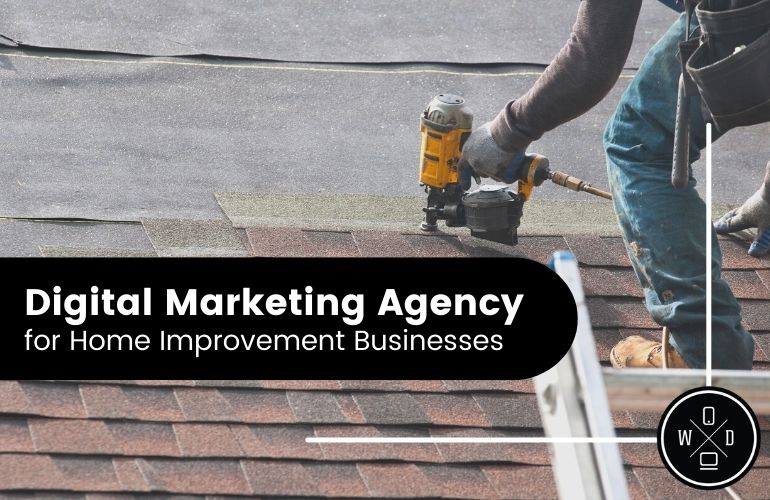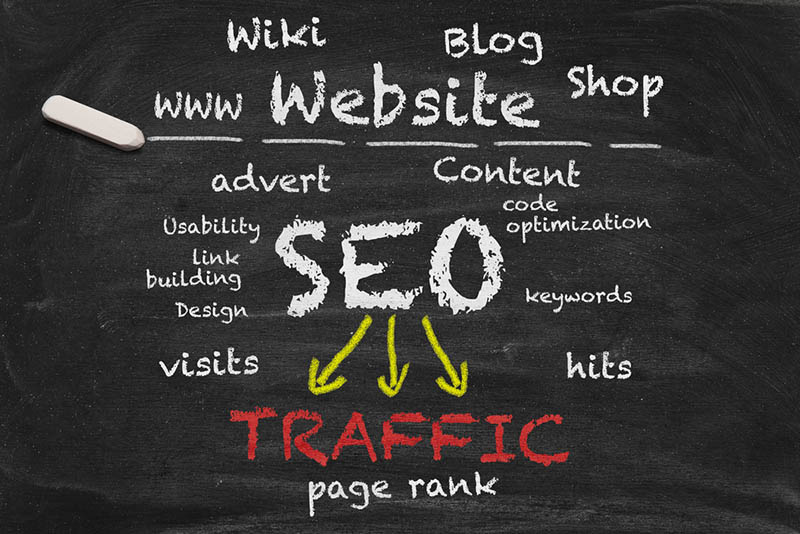
How Home Improvement Businesses Can Generate Leads with Digital Marketing

In today’s rapidly evolving digital landscape, having a strong online presence is essential for businesses across all industries, and home improvement businesses are no exception. Gone are the days when people primarily relied on word-of-mouth recommendations or the Yellow Pages to find a contractor or handyman. Now, potential customers turn to Google searches, social media, and online review platforms to find reputable home improvement services.
For home improvement businesses, digital marketing presents an incredible opportunity to not only increase brand visibility but also generate quality leads that convert into paying clients. In this blog post, we’ll dive into how home improvement companies can harness the power of digital marketing to grow their customer base and drive business growth. We’ll cover the most effective strategies and tactics that any business owner in the home improvement space should consider implementing.
Why Digital Marketing is Crucial for Home Improvement Businesses
The home improvement industry is highly competitive, and businesses that fail to adapt to the digital age risk falling behind. According to a study by the National Association of Home Builders (NAHB), 83% of home improvement customers begin their search for services online. With that in mind, here are some compelling reasons why digital marketing should be a key focus for your business:
- Cost-effectiveness: Compared to traditional advertising methods like billboards, radio, or print ads, digital marketing allows businesses to reach a larger audience at a fraction of the cost.
- Targeted outreach: Digital marketing allows you to target specific demographics, locations, and behaviors, ensuring that your marketing efforts reach the most relevant audience.
- Measurable results: With tools like Google Analytics, you can track the effectiveness of your campaigns and optimize them in real time, ensuring you get the highest return on investment (ROI).
- 24/7 visibility: Your website and social media platforms are available around the clock, providing potential customers with information about your services whenever they need it.
- Builds trust and credibility: A well-designed website and active social media presence help establish trust with potential clients, showcasing your expertise and past work through reviews and testimonials.
Key Digital Marketing Strategies for Home Improvement Businesses
To successfully generate leads online, home improvement businesses need to implement a combination of several digital marketing strategies. Below, we’ll cover the most impactful tactics that can help you boost your visibility and attract more customers.
1. Search Engine Optimization (SEO)
SEO is one of the most powerful tools in digital marketing. It involves optimizing your website so that it ranks higher in search engine results pages (SERPs) when potential clients search for home improvement services. The higher your website ranks on Google, the more likely potential customers will visit it.
Here are a few tips to improve your home improvement business’s SEO:
- Keyword Research: Identify the keywords and phrases that your target audience is searching for. Tools like Google Keyword Planner or SEMrush can help you discover valuable keywords like “kitchen remodeling near me” or “roof repair services.” Focus on both short-tail (general) and long-tail (more specific) keywords that reflect the services you offer.
- On-page SEO: Ensure that your website’s content includes those keywords, especially in headings, meta descriptions, image alt texts, and URLs. Also, ensure your website’s structure is easy to navigate and mobile-friendly, as this will improve your user experience and Google rankings.
- Local SEO: Since most home improvement businesses serve a specific geographical area, optimizing for local SEO is essential. Make sure you claim and optimize your Google My Business (GMB) listing, as this is crucial for appearing in Google’s Local Pack. Include your business name, address, phone number (NAP), and service areas.
- Content Marketing: Producing valuable content in the form of blog posts, guides, or how-to videos can help attract organic traffic. For example, writing a blog post titled “How to Choose the Right Contractor for Your Bathroom Remodel” is a great way to showcase your expertise while ranking for relevant keywords.

2. Pay-Per-Click (PPC) Advertising
While SEO focuses on organic search traffic, PPC allows you to buy your way to the top of search engine results. With PPC ads, such as Google Ads, you pay a fee each time a user clicks on your ad. This can be especially effective for generating immediate leads while waiting for your organic SEO efforts to bear fruit.
Some tips for effective PPC advertising:
- Targeting local customers: Use geo-targeting to ensure your ads are only shown to people within your service area. This maximizes the efficiency of your ad spend by targeting people who are more likely to convert.
- Bid on the right keywords: Like SEO, keyword research is critical for PPC campaigns. You’ll want to bid on high-intent keywords like “home improvement contractor in [City]” or “best window installation company.”
- Ad copy: Your ad copy should be clear, concise, and compelling. Highlight your business’s unique selling points (USPs), such as free consultations, quick turnaround times, or any special promotions.
3. Social Media Marketing
Social media platforms like Facebook, Instagram, Pinterest, and even TikTok have become popular marketing channels for home improvement businesses. These platforms allow you to showcase your work, engage with potential customers, and build a loyal following.
Here’s how you can leverage social media marketing effectively:
- Visual content: Home improvement is a visually driven industry, so showcasing high-quality images and videos of your completed projects can be incredibly impactful. Consider before-and-after photos of renovations, time-lapse videos of a project in progress, or virtual tours of completed homes.
- Engagement and Interaction: Respond to customer inquiries, share DIY tips, or participate in conversations around home improvement topics. Social media is all about engagement, so make sure you’re interacting with your followers regularly.
- Advertising: Facebook and Instagram Ads allow you to target potential customers based on their demographics, interests, and location. You can also create custom audiences based on your website visitors or past customers.
- Influencers and partnerships: Partnering with local influencers or bloggers in the home improvement niche can help expand your reach. Their audience may be interested in the services you provide, and a recommendation from a trusted source can go a long way.
4. Email Marketing
 Email marketing remains one of the most effective ways to nurture leads and turn them into loyal customers. Building an email list allows you to stay in touch with potential clients, keep them updated on promotions, and offer valuable content that encourages them to choose your business when the need arises.
Email marketing remains one of the most effective ways to nurture leads and turn them into loyal customers. Building an email list allows you to stay in touch with potential clients, keep them updated on promotions, and offer valuable content that encourages them to choose your business when the need arises.
Here’s how to use email marketing to your advantage:
- Lead capture forms: Place lead capture forms on your website, offering a free resource (like a home improvement checklist or renovation guide) in exchange for visitors’ email addresses.
- Personalized email campaigns: Once you’ve built an email list, send personalized email campaigns based on the recipient’s location, interests, or past interactions with your business. For example, someone who downloaded a kitchen remodeling guide might be interested in receiving an email about your latest kitchen renovation project.
- Follow-up emails: If someone contacts you for a quote or information, follow up with them via email. A series of automated emails can nurture the lead by providing more information, showcasing testimonials, or offering a discount.
5. Online Reviews and Reputation Management
For home improvement businesses, reputation is everything. Potential customers are more likely to hire a contractor with glowing reviews than one with no online presence or negative feedback. That’s why managing your online reviews is crucial for building trust and credibility.
Here’s how you can manage and leverage online reviews:
- Encourage happy customers to leave reviews: After completing a project, encourage satisfied customers to leave reviews on Google, Yelp, or other relevant platforms. Offer incentives, such as discounts on future services, to increase the likelihood of getting reviews.
- Respond to reviews: Show that you value customer feedback by responding to both positive and negative reviews. If a customer leaves a negative review, address their concerns professionally and attempt to resolve the issue. This demonstrates excellent customer service and shows potential clients that you care about your customers.
- Showcase reviews on your website: Add a testimonials section on your website where you feature the best reviews. This social proof can be a powerful tool in convincing potential clients to choose your services.
6. Retargeting Ads
Not every potential customer will convert the first time they visit your website. That’s where retargeting ads come in. These ads allow you to target users who have previously visited your website or engaged with your content but haven’t taken the next step (e.g., requested a quote or filled out a contact form).
- Personalized retargeting ads: Use retargeting to serve personalized ads that remind visitors of the services they were interested in. For example, if someone viewed your kitchen remodeling page but didn’t contact you, you can retarget them with an ad showcasing your latest kitchen renovation projects.
- Cross-channel retargeting: Retargeting works across multiple platforms, including Google Display Network, Facebook, and Instagram, ensuring that your brand stays top of mind for potential clients wherever they are online.
In an industry as competitive as home improvement, standing out from the crowd can be a challenge. However, by implementing a comprehensive digital marketing strategy that includes SEO, PPC, social media marketing, email marketing, online reviews, and retargeting ads, you can generate a steady stream of high-quality leads and grow your business.
Each of these strategies plays a role in driving traffic, building trust, and converting visitors into loyal customers. By consistently applying these tactics, your home improvement business will not only increase visibility but also build a reputation that keeps customers coming back for all their home improvement needs.